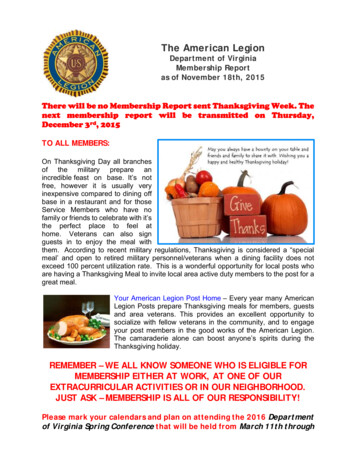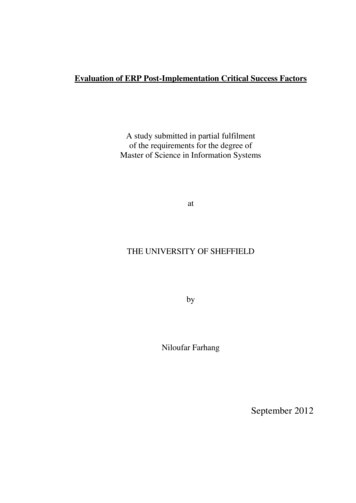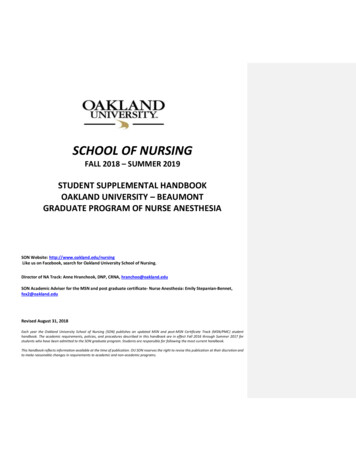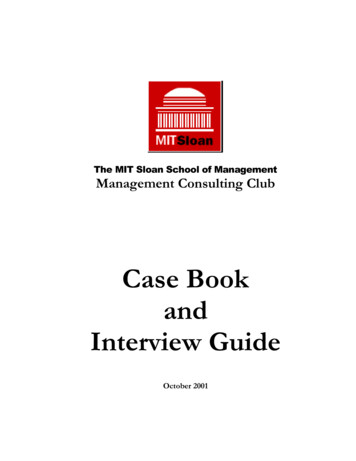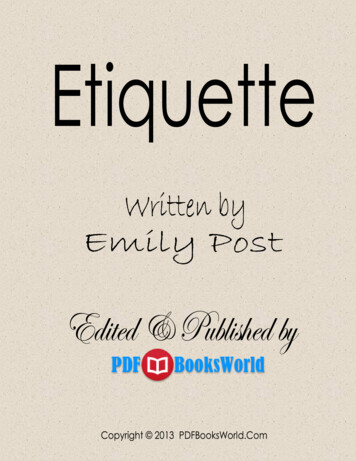
Transcription
0
EtiquetteIn Society, In Business, In PoliticsAnd At HomeByEmily PostAuthor of "Purple and Fine Linen," "The Title Market,""Woven in the Tapestry," "The Flight of a Moth," "Lettersof a Worldly Godmother," etc., etc.Illustrated With Private Photographs AndFacsimiles Of Social FormsThis eBook is designed, edited and published by PDFBooksWorld and can be accessed & downloadedfor personal reading by registered members of PDFBooksWorld at http://www.pdfbooksworld.com.Though the text, illustrations and images used in this book are out of copyright, this unique PDF formattededition is copyrighted. Readers of this book can share and link to pages of our website through blogs andsocial networks, however the PDF files downloaded from our website shall not be stored or transmitted inany form for commercial purpose.Disclaimer: This edition is an electronic version of a public domain book, which was originally written many decades ago. Hencecontents found in this eBook may not be relevant to the contemporary scenarios. This book shall be read for informative andeducational purpose only. This eBook is provided ‘AS-IS’ with no other warranties of any kind, express or implied, including but notlimited to warranties of merchantability or fitness for any purpose.1
ContentsEtiquette . 1Contents . 2INTRODUCTION. 3CHAPTER I . 13WHAT IS BEST SOCIETY?. 13CHAPTER II. 16INTRODUCTIONS. 16CHAPTER III . 34GREETINGS . 34CHAPTER IV. 39SALUTATIONS OF COURTESY . 39CHAPTER V . 46ON THE STREET AND IN PUBLIC . 462
INTRODUCTIONMANNERS AND MORALSByRichard DuffyMany who scoff at a book of etiquette would be shocked to hearthe least expression of levity touching the Ten Commandments.But the Commandments do not always prevent such virtuousscoffers from dealings with their neighbor of which no gentlemancould be capable and retain his claim to the title. Though it mayrequire ingenuity to reconcile their actions with the Decalogue—the ingenuity is always forthcoming. There is no intention in thisremark to intimate that there is any higher rule of life than theTen Commandments; only it is illuminating as showing therelationship between manners and morals, which is too oftenoverlooked. The polished gentleman of sentimental fiction has solong served as the type of smooth and conscienceless depravitythat urbanity of demeanor inspires distrust in ruder minds. Onthe other hand, the blunt, unpolished hero of melodrama andromantic fiction has lifted brusqueness and pushfulness to apedestal not wholly merited. Consequently, the kinship betweenconduct that keeps us within the law and conduct that makescivilized life worthy to be called such, deserves to be noted withemphasis. The Chinese sage, Confucius, could not tolerate thesuggestion that virtue is in itself enough without politeness, for heviewed them as inseparable and "saw courtesies as coming from3
the heart," maintaining that "when they are practised with all theheart, a moral elevation ensues."People who ridicule etiquette as a mass of trivial and arbitraryconventions, "extremely troublesome to those who practise themand insupportable to everybody else," seem to forget the long,slow progress of social intercourse in the upward climb of manfrom the primeval state. Conventions were established from thefirst to regulate the rights of the individual and the tribe. Theywere and are the rules of the game of life and must be followed ifwe would "play the game." Ages before man felt the need ofindigestion remedies, he ate his food solitary and furtive in somecorner, hoping he would not be espied by any stronger andhungrier fellow. It was a long, long time before the habit of eatingin common was acquired; and it is obvious that the practise couldnot have been taken up with safety until the individuals of the raceknew enough about one another and about the food resources tobe sure that there was food sufficient for all. When eating incommon became the vogue, table manners made their appearanceand they have been waging an uphill struggle ever since. Thecustom of raising the hat when meeting an acquaintance derivesfrom the old rule that friendly knights in accosting each othershould raise the visor for mutual recognition in amity. In theknightly years, it must be remembered, it was important to knowwhether one was meeting friend or foe. Meeting a foe meantfighting on the spot. Thus, it is evident that the conventions ofcourtesy not only tend to make the wheels of life run moresmoothly, but also act as safeguards in human relationship.Imagine the Paris Peace Conference, or any of the laterconferences in Europe, without the protective armor of diplomaticetiquette!4
Nevertheless, to some the very word etiquette is an irritant. Itimplies a great pother about trifles, these conscientious objectorsassure us, and trifles are unimportant. Trifles are unimportant, itis true, but then life is made up of trifles. To those who dislike theword, it suggests all that is finical and superfluous. It means agarish embroidery on the big scheme of life; a clog on the forwardmarch of a strong and courageous nation. To such as these, thewords etiquette and politeness connote weakness and timidity.Their notion of a really polite man is a dancing master or a manmilliner. They were always willing to admit that the French werethe politest nation in Europe and equally ready to assert that theFrench were the weakest and least valorous, until the war openedtheir eyes in amazement. Yet, that manners and fighting can gohand in hand appears in the following anecdote:In the midst of the war, some French soldiers and some nonFrench of the Allied forces were receiving their rations in a villageback of the lines. The non-French fighters belonged to an Armythat supplied rations plentifully. They grabbed their allotmentsand stood about while hastily eating, uninterrupted byconversation or other concern. The French soldiers took their verymeager portions of food, improvised a kind of table on the top of aflat rock, and having laid out the rations, including the smallquantity of wine that formed part of the repast, sat down incomfort and began their meal amid a chatter of talk. One of thenon-French soldiers, all of whom had finished their large supplyof food before the French had begun eating, asked sardonically:"Why do you fellows make such a lot of fuss over the little bit ofgrub they give you to eat?" The Frenchman replied: "Well, we aremaking war for civilization, are we not? Very well, we are.Therefore, we eat in a civilized way."5
To the French we owe the word etiquette, and it is amusing todiscover its origin in the commonplace familiar warning—"Keepoff the grass." It happened in the reign of Louis XIV, when thegardens of Versailles were being laid out, that the mastergardener, an old Scotsman, was sorely tried because his newlyseeded lawns were being continually trampled upon. To keeptrespassers off, he put up warning signs or tickets—etiquettes—onwhich was indicated the path along which to pass. But thecourtiers paid no attention to these directions and so thedetermined Scot complained to the King in such convincingmanner that His Majesty issued an edict commanding everyone atCourt to "keep within the etiquettes." Gradually the term came tocover all the rules for correct demeanor and deportment in courtcircles; and thus through the centuries it has grown into use todescribe the conventions sanctioned for the purpose of smoothingpersonal contacts and developing tact and good manners in socialintercourse. With the decline of feudal courts and the rise ofempires of industry, much of the ceremony of life was discardedfor plain and less formal dealing. Trousers and coats supplanteddoublets and hose, and the change in costume was not moreextreme than the change in social ideas. The court ceased to bethe arbiter of manners, though the aristocracy of the landremained the high exemplar of good breeding.Yet, even so courtly and materialistic a mind as LordChesterfield's acknowledged a connection between manners andmorality, of which latter the courts of Europe seemed so sparing.In one of the famous "Letters to His Son" he writes: "Moralvirtues are the foundation of society in general, and of friendshipin particular; but attentions, manners, and graces, both adorn andstrengthen them." Again he says: "Great merit, or great failings,6
will make you respected or despised; but trifles, little attentions,mere nothings, either done or reflected, will make you either likedor disliked, in the general run of the world." For all the wisdomand brilliancy of his worldly knowledge, perhaps no other writerhas done so much to bring disrepute on the "manners and graces"as Lord Chesterfield, and this, it is charged, because he debasedthem so heavily by considering them merely as the machinery of asuccessful career. To the moralists, the fact that the moralstandards of society in Lord Chesterfield's day were very differentfrom those of the present era rather adds to the odium that hasbecome associated with his attitude. His severest critics, however,do concede that he is candid and outspoken, and many admit thathis social strategy is widely practised even in these days.But the aims of the world in which he moved were routed by theonrush of the ideals of democratic equality, fraternity, and liberty.With the prosperity of the newer shibboleths, the old-time notionof aristocracy, gentility, and high breeding became more and morea curio to be framed suitably in gold and kept in the glass case ofan art museum. The crashing advance of the industrial age of goldthrust all courts and their sinuous graces aside for theunmistakable ledger balance of the counting-house. This neworder of things had been a long time in process, when, in the firstyear of this century, a distinguished English social historian, thelate The Right Honorable G.W.E. Russell, wrote: "Probably in allages of history men have liked money, but a hundred years agothey did not talk about it in society. Birth, breeding, rank,accomplishments, eminence in literature, eminence in art,eminence in public service—all these things still count forsomething in society. But when combined they are only as thedust of the balance when weighed against the all-prevalent power7
of money. The worship of the Golden Calf is the characteristic cultof modern society." In the Elizabethan Age of mighty glory, threehundred years before this was said, Ben Jonson had railed againstmoney as "a thin membrane of honor," groaning: "How hath alltrue reputation fallen since money began to have any!" Now thevery fact that the debasing effect of money on the social organismhas been so constantly reprehended, from Scriptural days onward,proves the instinctive yearning of mankind for a system of liferegulated by good taste, high intelligence and sound affections.But, it remains true that, in the succession of great commercialepochs, coincident with the progress of modern science andinvention, almost everything can be bought and sold, and soalmost everything is rated by the standard of money.Yet, this standard is precisely not the ultimate test of theChristianity on which we have been pluming ourselves throughthe centuries. Still, no one can get along without money; and fewof us get along very well with what we have. At least we think so—because everybody else seems to think that way. We Americansare members of the nation which, materially, is the richest, mostprosperous and most promising in the world. This idea is dinnedinto our heads continually by foreign observers, and publicly we"own the soft impeachment." Privately, each individual Americanseems driven with the decision that he must live up to the generalconception of the nation as a whole. And he does, but in lessstrenuous moments he might profitably ponder the counsel ofGladstone to his countrymen: "Let us respect the ancient mannersand recollect that, if the true soul of chivalry has died among us,with it all that is good in society has died. Let us cherish a sobermind; take for granted that in our best performances there arelatent many errors which in their own time will come to light."8
America, too, has her ancient manners to remember andrespect; but, in the rapid assimilation of new peoples into hereconomic and social organism, more pressing concerns take upnearly all her time. The perfection of manners by intensivecultivation of good taste, some believe, would be the greatest aidpossible to the moralists who are alarmed over the decadence ofthe younger generation. Good taste may not make men or womenreally virtuous, but it will often save them from what theologianscall "occasions of sin." We may note, too, that grossness inmanners forms a large proportion of the offenses that fanaticalreformers foam about. Besides grossness, there is also the meanerselfishness. Selfishness is at the polar remove from the worldlymanners of the old school, according to which, as Dr. Pusey wrote,others were preferred to self, pain was given to no one, no one wasneglected, deference was shown to the weak and the aged, andunconscious courtesy extended to all inferiors. Such was the"beauty" of the old manners, which he felt consisted in "actingupon Christian principle, and if in any case it became soulless, asapart from Christianity, the beautiful form was there, into whichthe real life might re-enter."As a study of all that is admirable in American manners, and asa guide to behavior in the simplest as well as the most complexrequirements of life day by day, whether we are at home or awayfrom it, there can be no happier choice than the present volume. Itis conceived in the belief that etiquette in its broader sense meansthe technique of human conduct under all circumstances in life.Yet all minutiæ of correct manners are included and no detail istoo small to be explained, from the selection of a visiting card tothe mystery of eating corn on the cob. Matters of clothes for menand women are treated with the same fullness of information and9
accuracy of taste as are questions of the furnishing of their housesand the training of their minds to social intercourse. But there isno exaggeration of the minor details at the expense of the moreimportant spirit of personal conduct and attitude of mind. Todwell on formal trivialities, the author holds, is like "measuringthe letters of the sign-boards by the roadside instead of profitingby the directions they offer." She would have us know also that "itis not the people who make small technical mistakes or evenblunders, who are barred from the paths of good society, but thoseof sham and pretense whose veneered vulgarity at every steptramples the flowers in the gardens of cultivation." To her mindthe structure of etiquette is comparable to that of a house, ofwhich the foundation is ethics and the rest good taste, correctspeech, quiet, unassuming behavior, and a proper pride of dignity.To such as entertain the mistaken notion that politeness impliesall give and little or no return, it is well to recall Coleridge'sdefinition of a gentleman: "We feel the gentlemanly characterpresent with us," he said, "whenever, under all circumstances ofsocial intercourse, the trivial, not less than the important, throughthe whole detail of his manners and deportment, and with theease of a habit, a person shows respect to others in such a way asat the same time implies, in his own feelings, and habitually, anassured anticipation of reciprocal respect from them to himself. Inshort, the gentlemanly character arises out of the feeling ofequality acting as a habit, yet flexible to the varieties of rank, andmodified without being disturbed or superseded by them."Definitions of a gentleman are numerous, and some of themfamous; but we do not find such copiousness for choice indefinitions of a lady. Perhaps it has been understood all along thatthe admirable and just characteristics of a gentleman should of10
necessity be those also of a lady, with the charm of womanhoodcombined. And, in these days, with the added responsibility of thevote.Besides the significance of this volume as an indubitableauthority on manners, it should be pointed out that as a socialdocument, it is without precedent in American literature. In orderthat we may better realize the behavior and environment of wellbred people, the distinguished author has introduced actualpersons and places in fictional guise. They are the persons and theplaces of her own world; and whether we can or can not penetratethe incognito of the Worldlys, the Gildings, the Kindharts, theOldnames, and the others, is of no importance. Fictionally, theyare real enough for us to be interested and instructed in their wayof living. That they happen to move in what is known as Society isincidental, for, as the author declares at the very outset: "BestSociety is not a fellowship of the wealthy, nor does it seek toexclude those who are not of exalted birth; but it is an associationof gentlefolk, of which good form in speech, charm of manner,knowledge of the social amenities, and instinctive considerationfor the feelings of others, are the credentials by which society theworld over recognizes its chosen members."The immediate fact is that the characters of this book arethoroughbred Americans, representative of various sections of thecountry and free from the slightest tinge of snobbery. Not all ofthem are even well-to-do, in the postwar sense; and their devicesof economy in household outlay, dress and entertainment are arevelation in the science of ways and means. There are parents,children, relatives and friends all passing before us in the pageantof life from the cradle to the grave. No circumstance, from anintroduction to a wedding, is overlooked in this panorama and the11
spectator has beside him a cicerone in the person of the authorwho clears every doubt and answers every question. In course, theconviction grows upon him that etiquette is no flummery ofposeurs "aping the manners of their betters," nor a code of snobs,who divide their time between licking the boots of those abovethem and kicking at those below, but a system of rules of conductbased on respect of self coupled with respect of others.Meanwhile, to guard against conceit in his new knowledge, hemay at odd moments recall Ben Jonson's lines:"Nor stand so much on your gentility,Which is an airy, and mere borrowed thing,From dead men's dust, and bones: And none of yoursExcept you make, or hold it."12
CHAPTER IWHAT IS BEST SOCIETY?"Society" is an ambiguous term; it may mean much or nothing.Every human being—unless dwelling alone in a cave—is a memberof society of one sort or another, and therefore it is well to definewhat is to be understood by the term "Best Society" and why itsauthority is recognized. Best Society abroad is always the oldestaristocracy; composed not so much of persons of title, which maybe new, as of those families and communities which have for thelongest period of time known highest cultivation. Our own BestSociety is represented by social groups which have had, since thisis America, widest rather than longest association with old worldcultivation. Cultivation is always the basic attribute of BestSociety, much as we hear in this country of an "Aristocracy ofwealth."To the general public a long purse is synonymous with highposition—a theory dear to the heart of the "yellow" press andeagerly fostered in the preposterous social functions of screendrama. It is true that Best Society is comparatively rich; it is truethat the hostess of great wealth, who constantly and lavishlyentertains, will shine, at least to the readers of the press, morebrilliantly than her less affluent sister. Yet the latter, through herquality of birth, her poise, her inimitable distinction, is often thejewel of deeper water in the social crown of her time.13
The most advertised commodity is not always intrinsically thebest, but is sometimes merely the product of a company withplenty of money to spend on advertising. In the same way, moneybrings certain people before the public—sometimes they arepersons of "quality," quite as often the so-called "society leaders"featured in the public press do not belong to good society at all, inspite of their many published photographs and the energies oftheir press-agents. Or possibly they do belong to "smart" society;but if too much advertised, instead of being the "queens" theyseem, they might more accurately be classified as the court jestersof to-day.THE IMITATION AND THE GENUINENew York, more than any city in the world, unless it be Paris,loves to be amused, thrilled and surprised all at the same time;and will accept with outstretched hand any one who can performthis astounding feat. Do not underestimate the ability that canachieve it: a scintillating wit, an arresting originality, a talent forentertaining that amounts to genius, and gold poured literally likerain, are the least requirements.Puritan America on the other hand demanding, as a ticket ofadmission to her Best Society, the qualifications of birth, mannersand cultivation, clasps her hands tight across her slim trim waistand announces severely that New York's "Best" is, in her opinion,very "bad" indeed. But this is because Puritan America, as well asthe general public, mistakes the jester for the queen.As a matter of fact, Best Society is not at all like a court with anespecial queen or king, nor is it confined to any one place or14
group, but might better be described as an unlimited brotherhoodwhich spreads over the entire surface of the globe, the members ofwhich are invariably people of cultivation and worldly knowledge,who have not only perfect manners but a perfect manner.Manners are made up of trivialities of deportment which can beeasily learned if one does not happen to know them; manner ispersonality—the outward manifestation of one's innate characterand attitude toward life. A gentleman, for instance, will never beostentatious or overbearing any more than he will ever be servile,because these attributes never animate the impulses of a wellbred person. A man whose manners suggest the grotesque isinvariably a person of imitation rather than of real position.Etiquette must, if it is to be of more than trifling use, includeethics as well as manners. Certainly what one is, is of far greaterimportance than what one appears to be. A knowledge of etiquetteis of course essential to one's decent behavior, just as clothing isessential to one's decent appearance; and precisely as one wearsthe latter without being self-conscious of having on shoes andperhaps gloves, one who has good manners is equally unselfconscious in the observance of etiquette, the precepts of whichmust be so thoroughly absorbed as to make their observance amatter of instinct rather than of conscious obedience.Thus Best Society is not a fellowship of the wealthy, nor does itseek to exclude those who are not of exalted birth; but it is anassociation of gentle-folk, of which good form in speech, charm ofmanner, knowledge of the social amenities, and instinctiveconsideration for the feelings of others, are the credentials bywhich society the world over recognizes its chosen members.15
CHAPTER IIINTRODUCTIONSTHE CORRECT FORMThe word "present" is preferable on formal occasions to theword "introduce." On informal occasions neither word isexpressed, though understood, as will be shown below. Thecorrect formal introduction is:"Mrs. Jones, may I present Mr. Smith?"or,"Mr. Distinguished, may I present Mr. Young?"The younger person is always presented to the older or moredistinguished, but a gentleman is always presented to a lady, eventhough he is an old gentleman of great distinction and the lady amere slip of a girl.No lady is ever, except to the President of the United States, acardinal, or a reigning sovereign, presented to a man. The correctintroduction of either a man or woman:To the President,is,"Mr. President, I have the honor to present Mrs. Jones, of Chicago."To a Cardinal,is,16
"Your Eminence, may I present Mrs. Jones?"To a King:Much formality of presenting names on lists is gone throughbeforehand; at the actual presentation an "accepted" name isrepeated from functionary to equerry and nothing is said to theKing or Queen except: "Mrs. Jones."But a Foreign Ambassador is presented, "Mr. Ambassador, mayI present you to Mrs. Jones."Very few people in polite society are introduced by their formaltitles. A hostess says, "Mrs. Jones, may I present the Duke ofOverthere?" or "Lord Blank?"; never "his Grace" or "hisLordship." The Honorable is merely Mr. Lordson, or Mr.Holdoffice. A doctor, a judge, a bishop, are addressed andintroduced by their titles. The clergy are usually Mister unlessthey formally hold the title of Doctor, or Dean, or Canon. ACatholic priest is "Father Kelly." A senator is always introduced asSenator, whether he is still in office or not. But the President ofthe United States, once he is out of office, is merely "Mr." and not"Ex-president."THE PREVAILING INTRODUCTION AND INFLECTIONIn the briefer form of introduction commonly used,"Mrs. Worldly, Mrs. Norman,"if the two names are said in the same tone of voice it is notapparent who is introduced to whom; but by accentuating themore important person's name, it can be made as clear as thoughthe words "May I present" had been used.17
The more important name is said with a slightly risinginflection, the secondary as a mere statement of fact. For instance,suppose you say, "Are you there?" and then "It is raining!" Use thesame inflection exactly and say, "Mrs. Worldly?"—"Mrs.Younger!"Are you there?—It is raining!Mrs. Worldly?—Mrs. Younger!The unmarried lady is presented to the married one, unless thelatter is very much the younger. As a matter of fact, in introducingtwo ladies to each other or one gentleman to another, nodistinction is made. "Mrs. Smith; Mrs. Norman." "Mr. Brown; Mr.Green."The inflection is:I think—it's going to rain!Mrs. Smith—Mrs. Norman!A man is also often introduced, "Mrs. Worldly? Mr. Norman!"But to a very distinguished man, a mother would say:"Mr. Edison—My daughter, Mary!"To a young man, however, she should say, "Mr. Struthers, haveyou met my daughter?" If the daughter is married, she shouldhave added, "My daughter, Mrs. Smartlington." The daughter'sname is omitted because it is extremely bad taste (except in theSouth) to call her daughter "Miss Mary" to any one but a servant,and on the other hand she should not present a young man to"Mary." The young man can easily find out her name afterward.OTHER FORMS OF INTRODUCTION18
Other permissible forms of introduction are:"Mrs. Jones, do you know Mrs. Norman?"or,"Mrs. Jones, you know Mrs. Robinson, don't you?" (on noaccount say "Do you not?" Best Society always says "don't you?")or,"Mrs. Robinson, have you met Mrs. Jones?"or,"Mrs. Jones, do you know my mother?"or,"This is my daughter Ellen, Mrs. Jones."These are all good form, whether gentlemen are introduced toladies, ladies to ladies, or gentlemen to gentlemen. In introducinga gentleman to a lady, you may ask Mr. Smith if he has met Mrs.Jones, but you must not ask Mrs. Jones if she has met Mr. Smith!FORMS OF INTRODUCTIONS TO AVOIDDo not say: "Mr. Jones, shake hands with Mr. Smith," or "Mrs.Jones, I want to make you acquainted with Mrs. Smith." Neversay: "make you acquainted with" and do not, in introducing oneperson to another, call one of them "my friend." You can say "myaunt," or "my sister," or "my cousin"—but to pick out a particularperson as "my friend" is not only bad style but, unless you haveonly one friend, bad manners—as it implies Mrs. Smith is "myfriend" and you are a stranger.19
You may very properly say to Mr. Smith "I want you to meetMrs. Jones," but this is not a form of introduction, nor is it to besaid in Mrs. Jones' hearing. Upon leading Mr. Smith up to Mrs.Jones, you say "Mrs. Jones may I present Mr. Smith" or "Mrs.Jones; Mr. Smith." Under no circumstances whatsoever say "Mr.Smith meet Mrs. Jones," or "Mrs. Jones meet Mr. Smith." Eitherwording is equally preposterous.Do not repeat "Mrs. Jones? Mrs. Smith! Mrs. Smith? Mrs.Jones!" To say each name once is quite enough.Most people of good taste very much dislike being asked theirnames. To say "What is your name?" is always abrupt andunflattering. If you want to know with whom you have beentalking, you can generally find a third person later and ask "Whowas the lady with the grey feather in her hat?" The next time yousee her you can say "How do you do, Mrs. ——" (calling her byname).WHEN TO SHAKE HANDSWhen gentlemen are introduced to each other they always shakehands.When a gentleman is introduced to a lady, she sometimes putsout her hand—especially if he is some one she has long heardabout from friends in common, but to an entire stranger shegenerally merely bows her head slightly and says: "How do youdo!" Strictly speaking, it is always her place to offer her hand ornot as she chooses, but if he puts out his hand, it is rude on
Emily Post Author of "Purple and Fine Linen," "The Title Market," . MANNERS AND MORALS By Richard Duffy Many who scoff at a book of etiquette would be shocked to hear the least expression of levity touching the Ten Commandments.


